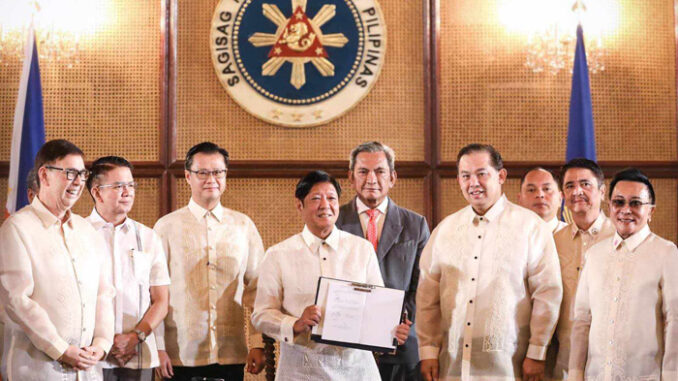
President Marcos on Wednesday enacted the Value-Added Tax on Digital Services Law, a piece of legislation that is expected to bring in some P105 billion in revenue to the government over the next five years.
The chief executive, however, assured that the new law is not intended to impose new taxes but rather streamline the collection process to help fund critical infrastructure projects.
“This law is more than ensuring tax compliance,” Mr. Marcos said during the law’s signing at Malacañang Palace.
“It is also in support of nation-building … fairness, inclusivity, and progress,” he added.
The VAT on Digital Services Law or Republic Act 12023 would impose a 12% consumption tax on foreign digital service transactions in the Philippines to address revenue losses resulting from ambiguous taxation rules.
However, digital educational services and subscriptions to educational institutions recognized by the government are exempt from the tax.
It seeks to level the playing field by ensuring that both local businesses and international digital platforms operating in the Philippines pay their fair share of taxes.
“If you are reaping the rewards of a fruitful digital economy here, it is only right that you contribute to its growth,” Mr. Marcos said.
“Whether you are a small tech start-up or a global tech giant, if you are making money in the Philippines, you are part of our community, and with that comes a shared responsibility,” he added.
The Department of Finance (DOF) and the Bureau of Internal Revenue (BIR) lauded the signing of RA 12023 as a crucial step toward promoting fairness in the Philippines’ digital economy.
DOF Director Nina Asuncion and BIR Commissioner Romeo Lumagui emphasized that the law addresses long-standing tax disparities between local and foreign digital service providers (DSPs).
Under the previous system, local businesses paid VAT while foreign competitors were not taxed, leading to unfair competition, they explained in a Palace briefing after the signing ceremonies.
“Republic Act 12023 levels the playing field between local and foreign businesses, particularly those that cannot shift to a digital platform,” Asuncion said..
Lumagui explained that the law ensures all DSPs, whether local or foreign, are subject to the same 12% VAT.
“This new law corrects the imbalance. It promotes fair competition and benefits consumers with improved services and fairer pricing,” he added.
The law also strengthens the BIR’s authority to collect VAT from DSPs operating in the Philippines and outlines compliance requirements for both resident and non-resident providers.
DSPs with annual gross sales exceeding P3 million are required to register under the VAT system.
The BIR is also empowered to block non-compliant DSPs through its Oplan Kandado program.
Meanwhile, the law’s enactment drew approval from the House of Representatives.
“I thank President Marcos for signing the VAT on nonresident DSPs with its earmarking of funds for the creatives sector,” said Albay Rep. Joey Salceda.
“For the longest time, our VAT system has taxed domestic creatives while allowing foreign companies to sell to Filipinos without any tax. This means that our local creatives sector was competing with their hands tied behind their backs while foreigners had full access to our market,” he explained.
The law covers a broad range of digital services, including digital platforms like Netflix, Spotify, Amazon, and Lazada.
Editor’s Note: This is an updated article. Originally posted with the headline “DOF, BIR hail newly-signed VAT on Digital Services Law.”


Be the first to comment